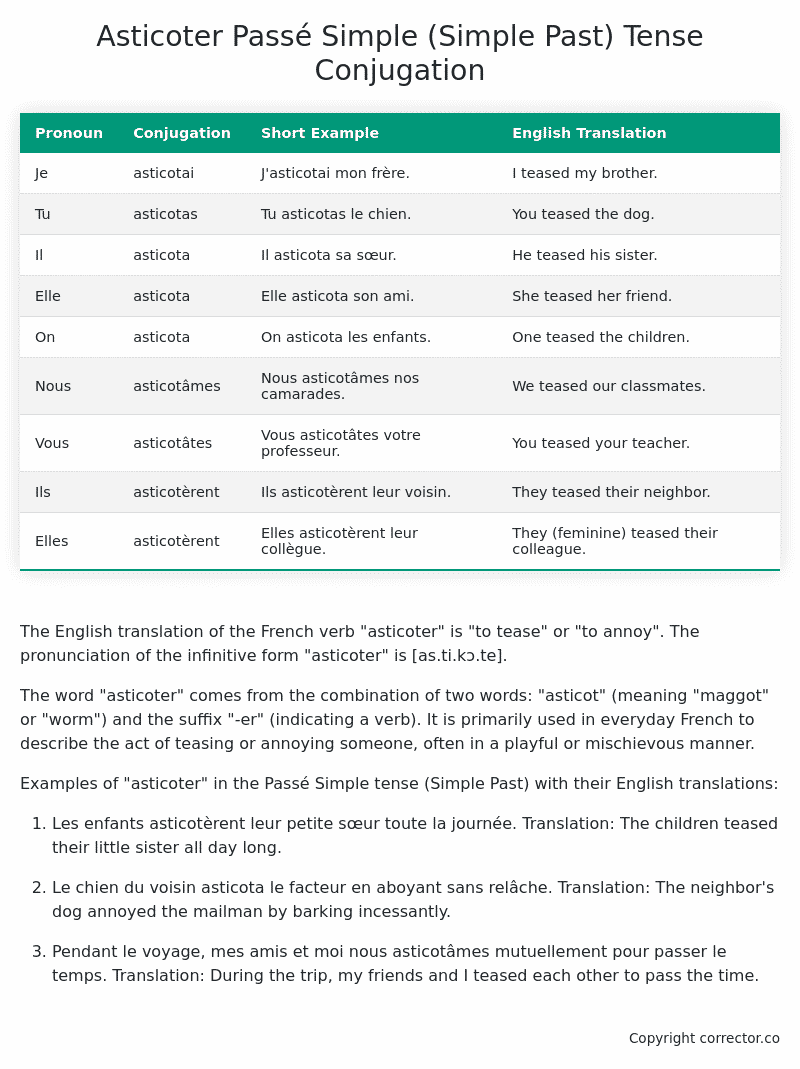Passé Simple (Simple Past) Tense Conjugation of the French Verb asticoter
Introduction to the verb asticoter
The English translation of the French verb “asticoter” is “to tease” or “to annoy”. The pronunciation of the infinitive form “asticoter” is [as.ti.kɔ.te].
The word “asticoter” comes from the combination of two words: “asticot” (meaning “maggot” or “worm”) and the suffix “-er” (indicating a verb). It is primarily used in everyday French to describe the act of teasing or annoying someone, often in a playful or mischievous manner.
Examples of “asticoter” in the Passé Simple tense (Simple Past) with their English translations:
-
Les enfants asticotèrent leur petite sœur toute la journée.
Translation: The children teased their little sister all day long. -
Le chien du voisin asticota le facteur en aboyant sans relâche.
Translation: The neighbor’s dog annoyed the mailman by barking incessantly. -
Pendant le voyage, mes amis et moi nous asticotâmes mutuellement pour passer le temps.
Translation: During the trip, my friends and I teased each other to pass the time.
Table of the Passé Simple (Simple Past) Tense Conjugation of asticoter
| Pronoun | Conjugation | Short Example | English Translation |
|---|---|---|---|
| Je | asticotai | J’asticotai mon frère. | I teased my brother. |
| Tu | asticotas | Tu asticotas le chien. | You teased the dog. |
| Il | asticota | Il asticota sa sœur. | He teased his sister. |
| Elle | asticota | Elle asticota son ami. | She teased her friend. |
| On | asticota | On asticota les enfants. | One teased the children. |
| Nous | asticotâmes | Nous asticotâmes nos camarades. | We teased our classmates. |
| Vous | asticotâtes | Vous asticotâtes votre professeur. | You teased your teacher. |
| Ils | asticotèrent | Ils asticotèrent leur voisin. | They teased their neighbor. |
| Elles | asticotèrent | Elles asticotèrent leur collègue. | They (feminine) teased their colleague. |
Other Conjugations for Asticoter.
Le Present (Present Tense) Conjugation of the French Verb asticoter
Imparfait (Imperfect) Tense Conjugation of the French Verb asticoter
Passé Simple (Simple Past) Tense Conjugation of the French Verb asticoter (You’re reading it right now!)
Passé Composé (Present Perfect) Tense Conjugation of the French Verb asticoter
Futur Simple (Simple Future) Tense Conjugation of the French Verb asticoter
Futur Proche (Near Future) Tense Conjugation of the French Verb asticoter
Plus-que-parfait (Pluperfect) Tense Conjugation of the French Verb asticoter
Passé Antérieur (Past Anterior) Tense Conjugation of the French Verb asticoter
Futur Antérieur (Future Anterior) Tense Conjugation of the French Verb asticoter
Subjonctif Présent (Subjunctive Present) Tense Conjugation of the French Verb asticoter
Subjonctif Passé (Subjunctive Past) Tense Conjugation of the French Verb asticoter
Subjonctif Imparfait (Subjunctive Imperfect) Tense Conjugation of the French Verb asticoter
Subjonctif Plus-que-parfait (Subjunctive Pluperfect) Tense Conjugation of the French Verb asticoter
Conditionnel Présent (Conditional Present) Tense Conjugation of the French Verb asticoter
Conditionnel Passé (Conditional Past) Tense Conjugation of the French Verb asticoter
Conditionnel Passé II (Conditional Past II) Tense Conjugation of the French Verb asticoter
L’impératif Présent (Imperative Present) Tense Conjugation of the French Verb asticoter
L’impératif Passé (Imperative Past) Tense Conjugation of the French Verb asticoter
L’infinitif Présent (Infinitive Present) Tense Conjugation of the French Verb asticoter
L’infinitif Passé (Infinitive Past) Tense Conjugation of the French Verb asticoter
Le Participe Présent (Present Participle) Tense Conjugation of the French Verb asticoter
Le Participe Passé (Past Participle) Tense Conjugation of the French Verb asticoter
Struggling with French verbs or the language in general? Why not use our free French Grammar Checker – no registration required!
Get a FREE Download Study Sheet of this Conjugation 🔥
Simply right click the image below, click “save image” and get your free reference for the asticoter Passé Simple tense conjugation!

Asticoter – About the French Passé Simple (Simple Past) Tense
Formation
Usage
Narration
Historical Context
Interactions with other tenses
Passé Composé
Imparfait
Conditional and Subjunctive
Summary
I hope you enjoyed this article on the verb asticoter. Still in a learning mood? Check out another TOTALLY random French verb conjugation!


